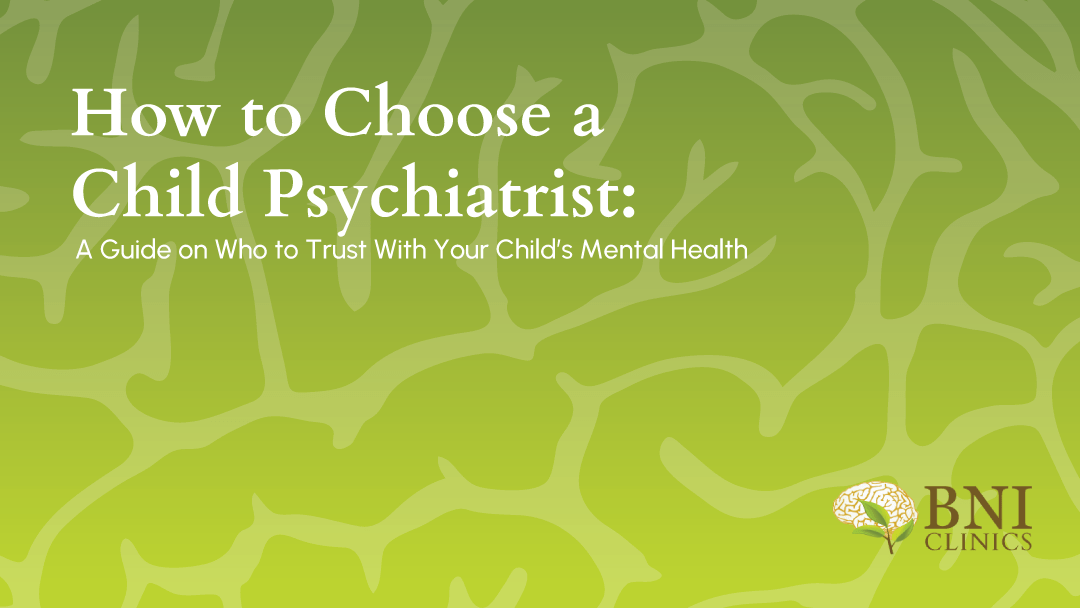How to Choose a Child Psychiatrist: A Guide on Who to Trust With Your Child’s Mental Health

50% of lifetime mental health conditions begin by age 14. Despite this, nearly 21% of children in California did not receive the mental healthcare they needed in 2021 and 2022.
One of the barriers to youth receiving the treatment they need is the overwhelming nature of the process. Parents often don’t know how to approach seeking out psychiatric care for their child.
At BNI Clinics, we work with clients of all ages, including children. We’re experts in our field, and if you need guidance on how to choose a child psychiatrist, we know what clinical excellence looks like. Here’s what to consider when seeking out children’s mental health services.
When to See a Child Psychiatrist – Spotting Symptoms That Are Reason for Concern
Some tantrums, mood swings, and ups and downs are normal in childhood. It’s when these behaviors greatly interfere in a child’s life that it might be time to seek additional help. Some signs a child could benefit from a psychiatrist include:
- Intense, frequent tantrums and anger
- Excessive worry
- Abnormal sleep patterns and eating habits
- Hopelessness
- Low self-esteem
- Self-destructive behavior, including self-harm or substance use
- Withdrawal from family, friends, and hobbies
- Repetitive, compulsive behaviors
- Talking about hearing or seeing things that aren’t there – mainly in older children
- Difficulty with social interaction
If you’re at all concerned about your child’s mental health, it’s a good idea to speak to their pediatrician. They can examine the child for any health complications, offer further advice, and potentially refer you to a child psychiatrist they trust.
Types of Child Psychiatric Services: The Job Titles and the Therapies
It’s important to know the difference between different types of child mental health professionals before you choose the right one for your child. There are three primary types: mental health counselors, psychologists, and psychiatrists. Mental health counselors provide either group or individual talk therapy and include clinical social workers. Psychologists can perform diagnostic testing and therapy. Psychiatrists primarily focus on diagnosing conditions and are licensed to treat them with medication.
There will be exceptions to these descriptions – a psychiatrist might also provide therapy, for example – but they are general guidelines for what you can expect.
There are also a variety of therapy options to consider for your child. Some of these include:
- Cognitive behavioral therapy (CBT) replaces negative thoughts with positive ones, influencing behavior for the better.
- Dialectical behavioral therapy (DBT) to manage extreme emotions and respond more rationally to triggers.
- Behavioral therapy involves reinforcing positive behaviors, often with rewards, to create better habits.
- Play therapy for therapists to learn about young children’s worlds through how they play, and help them practice new skills.
- Applied behavioral analysis (ABA) to reinforce appropriate behavior in children with autism spectrum disorders.
- Occupational therapy (OT) helps children practice skills they find challenging.
- Family counseling to address dysfunction in the family unit as a whole for the sake of the child.
How to Choose a Child Psychiatrist: Things to Consider
You should research the qualifications of any child mental health professional you consider. It’s good practice, even if they are recommended by someone you trust. Someone specializing in child and adolescent psychiatry is the best choice.
Finding the perfect fit will likely take some experimentation. You want a mental health professional both you and your child are comfortable with. They should communicate clearly, empathetically, and in a way your child understands and responds well to. They should also be open to questions from your child, and answer them patiently, thoroughly, and sincerely.
The mental health professional will likely assess your child at the first appointment to determine what type of therapy will benefit them most. They’ll speak to you and your child, both together and separately, about your concerns, family history, strategies that have helped and difficult areas, and their health history. After this, they should present you with a treatment plan and goals tailored to your child.
Consult with your child during this process. Their comfort is paramount. It’s okay if they feel uncomfortable at first. Encourage them to give it a chance, and if they continue to feel uneasy or like the therapist isn’t a good fit, trust them and look elsewhere. Trust your own instincts in the process as well.
Los Angeles Child Psychiatry at BNI Clinics
Choosing the right child psychiatry services can be a difficult task, and it isn’t one that should be taken lightly. Your child’s mental health is important and should be in the right hands. Don’t rush to find the right fit, and work together with your child to find someone you can both trust.
BNI Clinics offers psychiatric care and testing for all ages, from children to older adults. We are able to provide diagnosis, therapy, and psychiatry all under one roof, and our experience with all ages means your child can stay with us from childhood well into adulthood if they so choose. This allows special insight into your child’s growth and allows for the building of strong bonds between them and their mental health professional. Call us at (310) 691-5005 for more information.
BNI Clinics: Science-based, evidence-backed, compassion-led.




